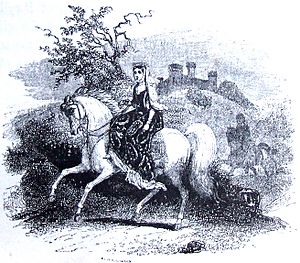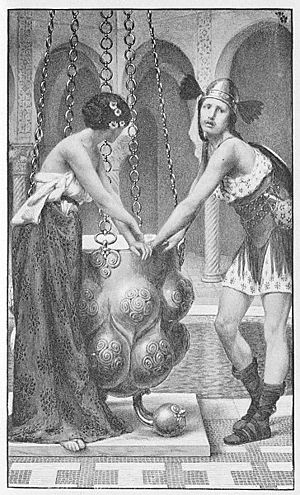Rhiannon facts for kids

Rhiannon is a very important character in Welsh mythology. She appears in two main parts of a famous collection of stories called The Mabinogi. People like Ronald Hutton have even called her "one of the great female personalities in World literature" because she's so unique. Rhiannon is a strong and smart woman from another magical world, sometimes called the Otherworld. She chooses Pwyll, a prince from Dyfed (which is in west Wales), to be her husband, even though she was already promised to someone else. She is known for being intelligent, good at planning, beautiful, and very generous. With Pwyll, she has a son named Pryderi, who later becomes the lord of Dyfed. After Pwyll dies, Rhiannon marries Manawydan, who is part of the British royal family. Together, they have more exciting adventures that involve magic.
Many people think Rhiannon might be based on an older Celtic goddess. Her name seems to come from an old Brittonic word that means "queen." In the first part of The Mabinogi, Rhiannon is strongly linked to horses, and so is her son Pryderi. Because of this, she is often thought to be connected to Epona, a horse goddess from ancient Gaul (which is now France). Rhiannon and her son are sometimes shown as a mare (female horse) and her foal. Like Epona, she often sits calmly on her horse. Most experts agree on this link to Epona, but some, like historian Ronald Hutton, are not so sure.
Contents
Rhiannon's Amazing Story
Rhiannon and Pwyll: The First Meeting
Rhiannon first appears at a special place called Gorsedd Arberth. This was an old mound near one of the main courts in Dyfed. Pwyll, the prince of Dyfed, had decided to try out the mound's magical challenge. The challenge was to see something amazing or get into a fight. Rhiannon shows up as the promised amazing sight. She is a beautiful woman wearing a gold silk dress and riding a shining white horse.
Pwyll sends his best horsemen to catch her for two days, but she always stays ahead, even though her horse just walks slowly. On the third day, Pwyll himself tries to follow her, but he can't catch up either. Finally, he asks her to stop. Rhiannon tells him off for not asking sooner! She then explains that she came to find him because she wants to marry him, not Gwawl ap Clud, who she was already supposed to marry. Pwyll is very happy and agrees.
The Tricky Wedding Feast
At their wedding feast at Rhiannon's father's court, a stranger asks Pwyll for a favor. Pwyll agrees without asking what it is. The stranger turns out to be Gwawl, Rhiannon's old fiancé, and he asks for Rhiannon!
Rhiannon scolds Pwyll again for making a rash promise without thinking. But she also comes up with a clever plan to fix things. She arranges a second wedding feast for Gwawl. She tells Pwyll's men to hide outside in the orchard. She then tells Pwyll to dress like a beggar and humbly ask Gwawl to fill a special 'small bag' with food. Rhiannon has used magic on this bag so it can never be filled normally. Gwawl is tricked into stepping into the bag to try and control its magic. This allows Pwyll to trap him inside. Pwyll's men then rush in and surround the hall. They beat and kick Gwawl in what they call the "Badger-in-the-Bag" game. To save himself, Gwawl has to give up Rhiannon completely and promise not to seek revenge. Rhiannon then marries Pwyll and travels to Dyfed to become its queen.
A Son is Born, Then Lost
After two happy years, Pwyll's nobles start pressuring him to have a child to inherit his kingdom. Pwyll refuses to leave Rhiannon, and in their third year, their son is born. However, on the night he is born, the baby disappears while Rhiannon's six maids are supposed to be watching him. The maids are scared they will be punished, so they kill a puppy and put its blood on Rhiannon's sleeping face. They then claim she ate her own baby.
Rhiannon talks to her own advisors and offers to accept a punishment. Pwyll is again told to leave her, but he refuses. Instead, he sets her punishment: she must sit by the castle gate every day and tell her story to travelers. She also has to offer to carry them on her back like a beast of burden, though most people don't accept. Even with this punishment, Pwyll still treats her as his queen, and she sits by his side at feasts.
The Lost Child Returns
The newborn child is found by Teyrnon, a lord from South-Eastern Wales. Teyrnon is a horse lord whose best mare gives birth every May Eve, but her foals always disappear. He brings the mare into his house and watches over her. After her foal is born, he sees a monstrous claw trying to take the foal through the window. He quickly slashes at the monster with his sword. When he rushes outside, the monster is gone, but a human baby is left by the door. Teyrnon and his wife claim the boy as their own. They name him Gwri Wallt Euryn, which means "Gwri of the Golden Hair," because all his hair was like gold.
The child grows incredibly fast and loves horses. Teyrnon, who used to serve Pwyll, notices that the boy looks a lot like Pwyll. Being an honorable man, Teyrnon returns the boy to the royal family of Dyfed. When the child is reunited with Rhiannon, he is formally named Pryderi. This name is a play on words, meaning both "delivered" and "worry" or "loss," referring to the trouble he caused. Later, Pwyll dies, and Pryderi rules Dyfed. He marries Cigfa and adds more lands to his kingdom.
New Adventures with Manawydan
Pryderi returns from a terrible war in Ireland as one of only seven survivors. Manawydan is another survivor and a good friend. They carry out their duty of burying the head of Britain's dead king, Bran the Blessed, in London to protect Britain from invaders. But while they were away, Manawydan's nephew Caswallon has taken over as king of Britain.
Manawydan decides not to fight another war to get his rights back. Pryderi generously gives him the use of the land of Dyfed, though Pryderi remains the ruler. Pryderi also arranges for the widowed Rhiannon to marry Manawydan. They quickly grow fond of each other. Pryderi is careful to show respect to Caswallon to avoid any trouble.
Manawydan now becomes the main character in this part of the story. One day, he, Rhiannon, Pryderi, and Cigfa sit on the Gorsedd Arberth, just as Pwyll had done before. But this time, something terrible happens. Thunder and a magical mist cover the land, leaving it empty of all animals and people, except for the four of them.
After living by hunting for a while, the four travel to areas near England and make a living using their skills. In three different cities, they start successful businesses making saddles, shields, and then shoes. But fierce competition puts their lives in danger. Instead of fighting, as Pryderi wants, Manawydan chooses to quietly move on.
The Enchanted Tower
Returning to Dyfed, Manawydan and Pryderi go hunting and follow a magical white boar to a newly built tower. Pryderi ignores Manawydan's advice and enters the tower to get his hunting dogs. He gets trapped by a beautiful golden bowl. Manawydan returns to Rhiannon, who sharply scolds him for not even trying to rescue his friend. But when Rhiannon tries to rescue her son, the same thing happens to her. In a "blanket of mist," Rhiannon, Pryderi, and the tower all disappear.
Manawydan eventually makes things right. He manages to get Rhiannon, Pryderi, and the land of Dyfed back. This involves some funny magical talks about a pregnant mouse. The magician Llwyd ap Cilcoed is forced to release the land and the family from his spells. He also promises never to attack Dyfed again. It turns out he was seeking revenge for his friend Gwawl, the man Rhiannon had rejected. In the end, everyone is reunited, and Dyfed is restored.
 | DeHart Hubbard |
 | Wilma Rudolph |
 | Jesse Owens |
 | Jackie Joyner-Kersee |
 | Major Taylor |


